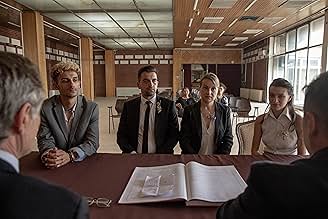IMDb रेटिंग
7.0/10
1.2 हज़ार
आपकी रेटिंग
अपनी भाषा में प्लॉट जोड़ेंDespite never aspiring to be a mother, Dita finds herself compelled to raise her girlfriend's two daughters. As their individual wills clash, a heartwarming story unfolds about an unlikely f... सभी पढ़ेंDespite never aspiring to be a mother, Dita finds herself compelled to raise her girlfriend's two daughters. As their individual wills clash, a heartwarming story unfolds about an unlikely family's struggle to stay together.Despite never aspiring to be a mother, Dita finds herself compelled to raise her girlfriend's two daughters. As their individual wills clash, a heartwarming story unfolds about an unlikely family's struggle to stay together.
- पुरस्कार
- 10 जीत और कुल 10 नामांकन
Mia Mustafi
- Vanesa
- (as Mia Mustafa)
Dzada Selim
- Mia
- (as Džada Selim)
Alina Serban
- Suada
- (as Alina Șerban)
Ajse Useini
- Teuta
- (as Ajshe Useini)
Rozafa Celaj
- Flora
- (as Rozafë Çelaj)
Aleksandra Pesevska
- Receptionist
- (as Aleksandra Peshevska)
फ़ीचर्ड समीक्षाएं
Dita is a white woman with a gypsy lesbian lover Suada, and Suada's daughters by different fathers - Vanessa in grade 9, and Mia aged 5. Also in the apartment is Dita's white gay friend Toni, and his new boy-toy, the gypsy Ali. Both Suada and Ali hail from Shutka, the gypsy (Roma) municipality, and at times Ali manages to play fixer.
Aware that she may die of cancer, and having experienced racial discrimination in earlier life, Suada tries to get her girls to recognize Dita as mother and Toni as father, and even gets Toni's name on their birth certificates. But when she dies, Mia bonds with Ali, while Vanessa rejects this family, wanting either to "go home" to grandma, or to marry a boy who is going abroad.
This film likely hits themes that are more relevant in North Macedonia than in Canada, but still is an interesting exposition of the life of minorities. There are dual themes of discrimination by ethnicity and sexuality. There is a brief scene where Dita "straightens out" her living room and Toni, expecting police to show up after Vanessa acts out. But the scenarios are believable, and the performances good, especially Mia, whose role was written well for her.
The dialog in Shutka is tricky, as there is Romany mixed in, and the subtitles don't show the language differences, making me scramble to try to figure out what language was being spoken. Also, some of the hand-held camera work was a bit shaky.
Aware that she may die of cancer, and having experienced racial discrimination in earlier life, Suada tries to get her girls to recognize Dita as mother and Toni as father, and even gets Toni's name on their birth certificates. But when she dies, Mia bonds with Ali, while Vanessa rejects this family, wanting either to "go home" to grandma, or to marry a boy who is going abroad.
This film likely hits themes that are more relevant in North Macedonia than in Canada, but still is an interesting exposition of the life of minorities. There are dual themes of discrimination by ethnicity and sexuality. There is a brief scene where Dita "straightens out" her living room and Toni, expecting police to show up after Vanessa acts out. But the scenarios are believable, and the performances good, especially Mia, whose role was written well for her.
The dialog in Shutka is tricky, as there is Romany mixed in, and the subtitles don't show the language differences, making me scramble to try to figure out what language was being spoken. Also, some of the hand-held camera work was a bit shaky.
Following the intensity and romantic themes of his earlier works, Goran Stolevski, the talented Macedonian-Australian director, presents a different facet in this vibrant and chaotic domestic drama. This film has been chosen as Macedonia's submission for the international Oscar shortly after its debut in the Horizons section of the Venice Film Festival, and the rationale is evident. The Romale lifestyle is perpetually engaging, both on and off the screen, and is inherently dramatic-ideal for cinematic storytelling. Naturally, to secure European Commission funding, a narrative with LGBTQ+ themes is often necessary, resulting in a film that is inclusive and reflective of contemporary society. But, I personally do not think there is any chance you could have so many gay people at one place in a city like Skopje - only way is if they were part of some "gay sect" as Mia Mustafi
as Vanesa insinuated to the police in one of the scenes.
Having spent several years in Skopje, I found the portrayal somewhat surreal-only the Roma characters resonated as authentic. The other characters were intended to represent a modern family dynamic: Dita (Anamaria Marinca), an Albanian lesbian from Kosovo; Dita's Roma partner Suada (Alina Serban); the brooding teenager Vanesa (Mia Mustafa) and the exuberant kindergartener Mia (Dzada Selim), who are Suada's daughters from previous relationships; along with Dita's long-time gay friend Toni (Vladimir Tintor). Stolevski immerses the audience in this unconventional scenario with minimal exposition, trusting viewers to discern the relationships and backstories through the dialogue and physical interactions. The film's opening, which introduces the characters through their interactions, was particularly effective; however, the narrative lost its focus in the final act, feeling hurried and lacking depth.
While I will refrain from divulging too much of the plot, I must express my discontent with co-productions that prioritize foreign actors for lead roles. In this instance, Romanian-born Anamaria Marinca struggled to embody her character, appearing detached even during the most poignant scenes. In contrast, Serbian actor Vladimir Tintor delivered a stronger performance, yet I believe there were numerous Macedonian actors who could have matched or surpassed his portrayal.
The film features commendable cinematography and competent direction, though it suffers from inconsistencies, the screenplay was warm and dramatic, camera work challenging and sometimes adventurous... things were mostly good!
Having spent several years in Skopje, I found the portrayal somewhat surreal-only the Roma characters resonated as authentic. The other characters were intended to represent a modern family dynamic: Dita (Anamaria Marinca), an Albanian lesbian from Kosovo; Dita's Roma partner Suada (Alina Serban); the brooding teenager Vanesa (Mia Mustafa) and the exuberant kindergartener Mia (Dzada Selim), who are Suada's daughters from previous relationships; along with Dita's long-time gay friend Toni (Vladimir Tintor). Stolevski immerses the audience in this unconventional scenario with minimal exposition, trusting viewers to discern the relationships and backstories through the dialogue and physical interactions. The film's opening, which introduces the characters through their interactions, was particularly effective; however, the narrative lost its focus in the final act, feeling hurried and lacking depth.
While I will refrain from divulging too much of the plot, I must express my discontent with co-productions that prioritize foreign actors for lead roles. In this instance, Romanian-born Anamaria Marinca struggled to embody her character, appearing detached even during the most poignant scenes. In contrast, Serbian actor Vladimir Tintor delivered a stronger performance, yet I believe there were numerous Macedonian actors who could have matched or surpassed his portrayal.
The film features commendable cinematography and competent direction, though it suffers from inconsistencies, the screenplay was warm and dramatic, camera work challenging and sometimes adventurous... things were mostly good!
I didn't know what to expect from this unknown director and cast (at least, to me), but I was pleasantly surprised by this bittersweet drama. Direction was very good, as well as the acting. The story is interesting and credible (I thought), and you really feel for 'mamma Dita' and her two 'adopted' kids.
The story goes as follows: Dita never wanted to become a mother, but is forced by circumstances to take care of her friend's two daughters: the little troublemaker Mia and the rebellious teenager Vanesa. The three strong personalities clash, but against all odds they grow into a close-knit family that has to fight to stay together.
As someone put it, it's 'a messy look at class divisions in Macedonia', and also at how the LGBT community copes with a not-so-tolerant environment.
A little gem that should definitely find its public.
At least, I hope so.
The story goes as follows: Dita never wanted to become a mother, but is forced by circumstances to take care of her friend's two daughters: the little troublemaker Mia and the rebellious teenager Vanesa. The three strong personalities clash, but against all odds they grow into a close-knit family that has to fight to stay together.
As someone put it, it's 'a messy look at class divisions in Macedonia', and also at how the LGBT community copes with a not-so-tolerant environment.
A little gem that should definitely find its public.
At least, I hope so.
Australians had better start claiming this gifted writer/director as one of their own quick-smart. This is Goran Stolevski's 3rd feature release in as many years. He has a knack for authentic, energetic stories fleshed with deeply flawed, funny, evolving characters. He is also a wonderful storyteller. In lesser hands, this could be a well-worn tale of misfits and society's marginalia finding a place to call home. But in Stolevski's deft hands, we get carried into a universal tumble-dryer about everybody's family and our need for a place where we can need and want and feel. The performances he manages to get out of his 5 year-old scene stealer and the cast of dozens of untrained actors is a masterclass for up-and-coming film-makers. Stolevski's raw, intimate cinematography and energetic editing complete the showcase of instincts this talented film-maker is blessed with. I hope he starts to get the attention he deserves.
- I did not know anything about the director and the movie. Just thought of giving it a try and I was pleasantly surprised
- The mixture of different kind of people coming together with their own flaws and strengths made me deeply moved. It just symbolised to me the whole humanity.
- It made me think and learn more about the Roma people by googling. It subtly teaches you to be empathetic, to be calm with chaos around and basically every human is same. Longs for love, affection at the same time battling with one's ego.
- few nitpicks: music seemed to be lacking. Yes without music movie seems more realistic/documentary-like but it can be used to enhance the emotional depth IMO.
क्या आपको पता है
- ट्रिवियाOfficial submission of North Macedonia for the 'Best International Feature Film' category of the 96th Academy Awards in 2024.
- साउंडट्रैकCeresna Se Od Koren, Kornese
Macedonian Traditional Song
टॉप पसंद
रेटिंग देने के लिए साइन-इन करें और वैयक्तिकृत सुझावों के लिए वॉचलिस्ट करें
- How long is Housekeeping for Beginners?Alexa द्वारा संचालित
विवरण
- रिलीज़ की तारीख़
- कंट्री ऑफ़ ओरिजिन
- भाषाएं
- इस रूप में भी जाना जाता है
- Housekeeping for Beginners
- फ़िल्माने की जगहें
- उत्पादन कंपनियां
- IMDbPro पर और कंपनी क्रेडिट देखें
बॉक्स ऑफ़िस
- US और कनाडा में सकल
- $2,80,510
- US और कनाडा में पहले सप्ताह में कुल कमाई
- $47,225
- 7 अप्रैल 2024
- दुनिया भर में सकल
- $3,30,052
- चलने की अवधि1 घंटा 47 मिनट
- रंग
- ध्वनि मिश्रण
इस पेज में योगदान दें
किसी बदलाव का सुझाव दें या अनुपलब्ध कॉन्टेंट जोड़ें































